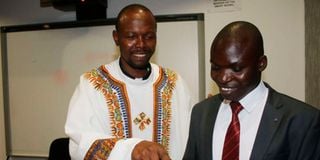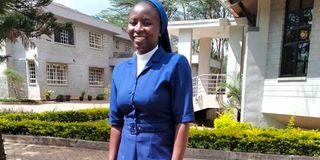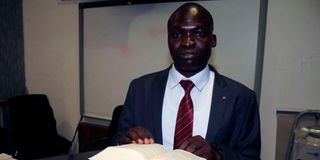Premium
High-flying Catholics who put priesthood, sisterhood ahead of other careers

Father Oscar Momanyi (left) and Vincent Opiyo at Nation Centre, Nairobi, on May 17, 2019
The call comes in the form of: “Okay, you have got a good education and a good career is beckoning, but would you please put your aspirations aside and serve God?”
Then the person is required to be celibate for the rest of his or he life, not to own property, and to pledge absolute obedience to the church.
Sounds tough, right? Regardless, there are men and women who said “yes”. They had studied up to post-secondary level and some had even been employed somewhere. But they put all that on the back burner to start the journey towards being priests and nuns.
Nyeri Archbishop Anthony Muheria is perhaps the most notable example in Kenya. He had studied civil engineering at the University of Nairobi and worked for some time before he left it all to join the seminary.
Last week, Lifestyle spoke with three other Catholic ministers ahead of the Easter weekend that is a moment of reflection on sacrifice and service of God.
Sr Rodah Bonareri Mose

Sr Rodah Bonareri Mose of the Congregation of the Daughters of Charity of St Vincent de Paul.
She graduated with an information science degree from Moi University in 2012. But today, she is a nun with the Congregation of the Daughters of Charity of St Vincent de Paul.
Sr Rodah has gone through a number of stages towards becoming a nun and she has made her vows for the first time.
“I am now in the period of ongoing formation after vows,” she said.
In one of the earlier stages, called the novitiate stage, she was sent to her formation’s convent in Nairobi where she spent six years attending to the sick.
“I worked for six years in a comprehensive care and treatment programme for people living with HIV/Aids as the monitoring and evaluation officer,” she said.
Born in Kericho County 33 years ago, Sr Rodah’s spirituality grew when she was a student at Chepkechei Mixed Secondary School.
“My spiritual life as a child and teenager had its ups and downs; I was a baptised Catholic living in a remote outstation of Nyagacho, where we had Mass at most once a month. There were no religious sisters around and when I was in Form One, I thought I would become a priest,” Sr Rodah said.
As the pull towards the church got stronger, there was also a determination in her to become an engineer. She remembers contemplating to be an engineer and a priest.
But she got a reality check when she spoke to a priest monk who told her that in the Catholic Church, women become sisters and not priests as she had aspired.
“He advised me to study first before making such a huge life decision. I passed well to go to the university, and I joined Moi University in Eldoret where I pursued a bachelor of science degree in Information Sciences (IS). I chose IS because I thought engineering would not fit sisters,” said Sr Rodah.
So, had she made up her mind that she would become a sister after university or the thought came later?
“Making such a decision is not a one-off event. I started thinking about offering my life to God seriously in my final year in secondary school. I prayed about it, imploring the good Lord to show me without any doubt that this is what He was calling me to. As I went to university, I thought and prayed about it,” answered Sr Rodah.
She went on: “One time during my prayer, I was drawn to and touched by the Gospel of Matthew 25:31-46 and through it, I was finally convinced that I was being called to religious life. My next prayer to God was to help me discern which congregation to go to.”
“When I met the Daughters of Charity, I immediately felt that this was the community for me as I experienced a deep sense of peace and joy, both signs of the Holy Spirit. Their dedication to a life of service to people who live in poverty resonated with the Gospel passage I had been drawn to in Matthew: ‘I was hungry and you gave me food…,’”added Sr Rodah.
Her formation is big on serving the downtrodden and Sr Rodah says she enjoys every bit of it.
“The vows we take are chastity, poverty, and obedience, but for my particular congregation we take a fourth but primary vow: service of the poor. I do not often think of the vows as a sacrifice because from my experience, they have been freeing,” said Sr Rodah.
Her typical day entails prayers that may happen in the form of meditation or community prayers and Mass. There are also times for relaxation and for common activities.
By taking the vow of chastity, she promised not to be in a relationship “with one specific person”.
“Not having a family frees me to be available, with unconditional love, to my sisters in community and the many people we are called to serve,” said the nun.
She went on: “The vow of poverty frees my heart from being attached to material things keeping in mind that we are all stewards; all that we have belongs to those that are in need. And finally, the vow of obedience helps me to surrender my own will so that I can freely embrace the will of God.”
Sr Rodah, who is currently pursuing a master’s degree at Tangaza University College, said she has no regrets at all about making the choice.
“If time was to be reversed, I would make the same decisions all over again,” she said.
And what is her Easter message to readers? “Seek the truth; the truth about God and our very existence. The truth that Jesus prayed in John 17:19, that we all may be consecrated in the truth.”
Sr Rodah also had a message for young people: “Working for God and humanity is not a waste of time or resources but a fulfilment of life itself. So, take a risk of trusting God. You will never be disappointed.”
Fr Oscar Momanyi, SJ

Fr Oscar Momanyi of the Mwangaza Jesuit Spirituality Centre in Nairobi.
In 2004, he graduated with a degree in chemistry from Moi University. After graduation, he taught chemistry and biology at St Mary’s Viwandani Secondary School in Nairobi.
Fast-forward to 2018, at the St Joseph the Worker Parish in Nairobi’s Kangemi when he was ordained a priest.
How did Fr Momanyi’s life story dovetail into the priesthood? He told Lifestyle that from as far back as primary school, he had an ambition to become a Catholic priest.
“I began thinking about becoming a Catholic priest when I was in Standard Seven at Kitale Academy Primary School. I used to look at the altar boys and the priest at the Immaculate Conception Parish and I would say to myself, ‘One day, I will be at that altar as a priest,’” recalled Fr Momanyi.
As a secondary school student at St Joseph Boys High School in Kitate, he met Irish priests who worked as chaplains and teachers at the school.
“One of them was my English teacher. I was captivated by the fact that someone can be both a teacher and a priest. From that realisation, I decided early on that I would like to be such a priest: a serious intellectual and a holy man as well,” Fr Momanyi said.
His spiritual fire would ignite even stronger in his days as a Moi University, thanks to a young group of Christians who used to pray together.
“The group was called Christian Life Community (CLC). While in that CLC group, I came to discover Ignatian Spirituality, the spirituality of St Ignatius of Loyola. Each morning, we prayed together following the way of life proposed by St Ignatius. Each weekend, we met to share what was going on in our lives and how God was guiding us. That spirituality captivated me, and I began to think seriously about becoming a Jesuit priest so that I could follow the impressive way of St Ignatius of Loyola more fully,” said Fr Momanyi.
“I also came to learn that the Jesuits were an intellectual bunch of priests and brothers. That fact attracted me too, since that is what I also wanted to be as a priest,” added the priest.
After university, he taught in Viwandani then in 2007, he headed to Tanzania to begin his journey towards being a priest.
“I joined the Gonzaga Gonza Jesuit Novitiate in Arusha, Tanzania, for my initial seminary formation. Afterwards in 2009, I was sent to Arrupe Jesuit University in Harare, Zimbabwe, to study philosophy. I spent three pleasant years of intellectual delight in Harare,” Fr Momanyi narrated.
Between 2012 and 2014, he was in South Sudan where he worked at the Jesuit Loyola Secondary School in the town of Wau. He would later travel to the US state of California where he studied theology and finalised his studies towards his ordination.
Currently, Fr Momanyi is based at the Mwangaza Jesuit Spirituality Centre in Karen, Nairobi.
“I do retreat work, guiding people in their prayers, helping them to discern the will of God in their lives. I also do spiritual direction or spiritual counselling for people who come to seek to deepen their relationship with God in an ongoing way,” he said. “It is a very rewarding ministry.”
And what is his Easter message to readers?
“Easter is a time to celebrate the joy of the risen Christ. In all that we may be experiencing at the moment, individually, as a community of believers, as a nation, or as a worldwide people of God, Easter invites us to know that the Risen Christ is walking with us, guiding us even in the challenges we may face,” said Fr Momanyi.
Vincent Opiyo, SJ

Vincent Opiyo.
He wrote the main feature in the Lifestyle magazine of May 19, 2019, explaining why he was abandoning his life as a sports journalist to embark on a journey to the priesthood.
“I have made one of the toughest decisions to ‘keep on fighting’ by leaving my virtuous job at Nation Media Group to pursue priesthood through the Jesuits — a Roman Catholic congregation of priests and brothers,” he wrote.
As soon as he made the decision, he relocated to Tanzania. Today, he is in the Democratic Republic of Congo, studying philosophy at the Université Loyola du Congo. He has had to learn French fast because it is the primary language of instruction.
In a Zoom call, Vincent said he is progressing well in the long journey towards becoming a priest.
“I am in the formation stage,” he said. “Normally, we start with three years of novitiate formation, which I did in Tanzania, in Arusha. And now I’m in my first year of philosophy.”
He went on: “What follows is philosophy, which takes three years, two years of a pastoral experience; where we go in one of our communities, whether in a parish, or you can go to a school to teach, or you can go to a retreat centre, like Mwangaza in Karen to just help there.”
“After those two years, there’s four years of theology. So it’s in theology that you’ll get to be ordained deacon and then priest. So, I still have a long way to go,” added Vincent.
The 31-year-old got his secondary education at the St Peter’s Minor Seminary in Kakamega between 2006 and 2009. Between 2011 and 2014, he was at the Kenya Institute of Mass Communication (KIMC) where he obtained a diploma in broadcast journalism.
After KIMC, he worked as a sports analyst on Milele FM then later began contributing to the Mwanaspoti newspaper from June 2015. He also did sports analysis on NTV. He had also had a stint at community radio Pamoja FM in Kibera.
So, is he applying his journalism knowledge in his current endeavours?
“When I went to the novitiate, I actually thought it was the end of my journalism skills. But I found there was already a newsletter in place. And so I continued to contribute partly even to the designing and all that. We even came up with a 60-page yearbook after two years. I was actually behind the production. So, I continue practicing my photography skills. Now here, we also have a monthly newsletter, which I contribute to write,” said Vincent.
“The good thing with our religious congregation is that we move with the changing world,” he added.
So, is he allowed to follow football and other sporting activities?
“One of our charisms is finding God in everything. And that includes finding God even in sports,” he answered. “Sports are still partly part of me because it contributes to my spiritual life. And I still have conversations with some of the football players I was close with.”
He went on: “When I share with my spiritual formators, they encourage that because we are still in the world, we are still part of the world. We have not side-lined ourselves from the world.”
Vincent believes that when he finally becomes a priest, his knowledge in journalism will help him a great deal because he is good with communication.
“There is some kind of advantage in being a journalist as a priest, because, one, you have mastered the communication skills and that your word can persuade, you know, your spiritual conversation,” he said.
His Easter message is that people should face moments of difficulty with bravery because the joy akin to the Easter triumph over death will come.
“God is always with us even in times of suffering and he is always with us and even in times of joy,” said Vincent.





